A Comparative Look at Mosaic and Deltek in Scenario Planning
Choosing the right tool for scenario planning is crucial for effectively forecasting and strategic decision-making. Mosaic and Deltek are two leading solutions, each with unique strengths and capabilities. This article provides an in-depth comparison to help organizations decide which platform better suits their scenario planning needs, considering features, usability, integration, and the nature of their planning requirements.
Understanding Scenario Planning Needs: Flexibility Versus Depth
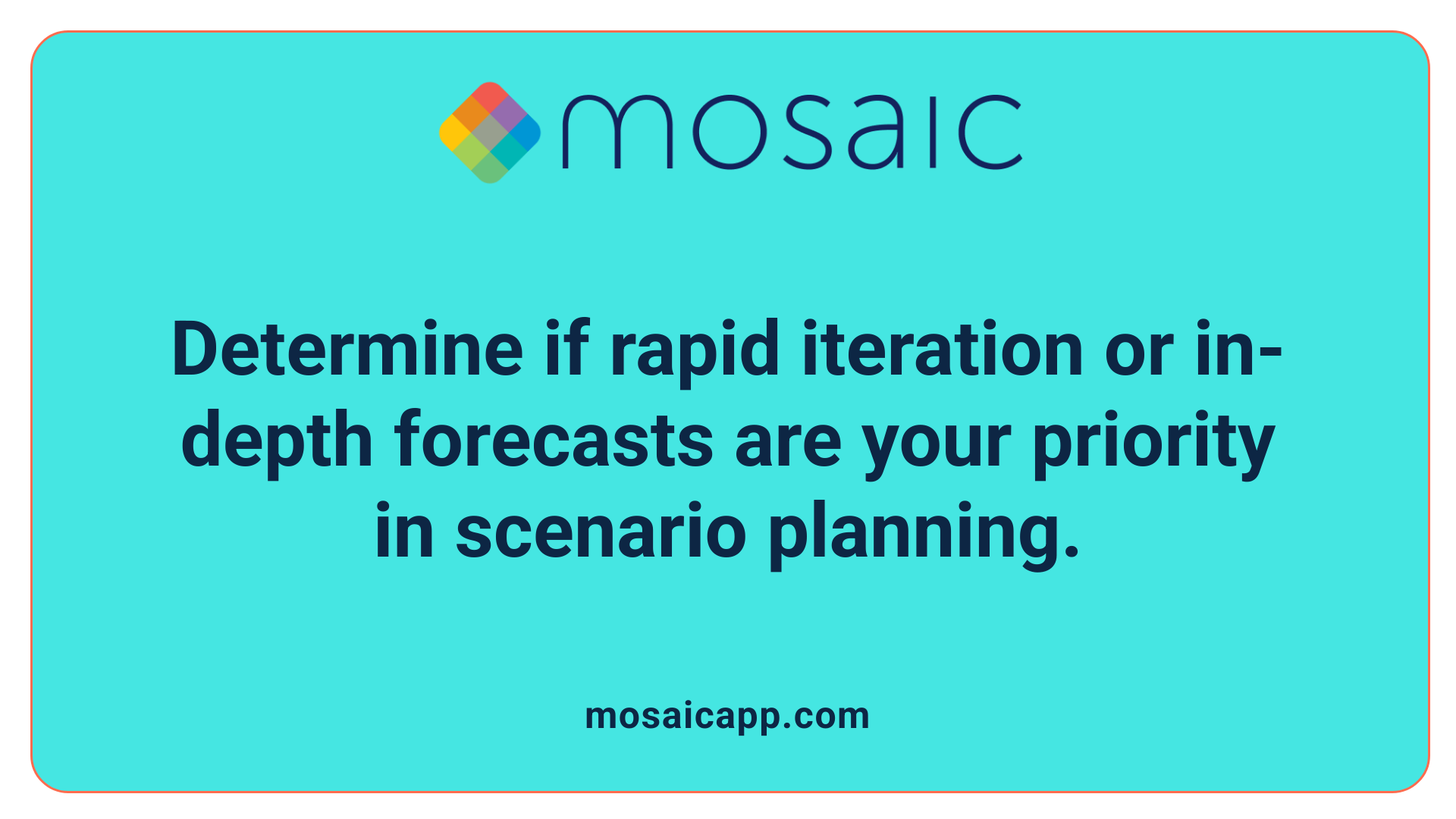
When comparing Mosaic and Deltek for scenario planning, their approaches reflect differing priorities suited to various organizational needs.
Mosaic emphasizes flexibility and rapid iteration. It provides an easy-to-use platform that allows users to quickly create multiple scenarios and adapt them on the fly. This makes Mosaic particularly effective for organizations that need to respond swiftly to changing conditions or explore various options without complex setup.
Deltek, by contrast, offers a more comprehensive and detailed approach to scenario analysis. It integrates extensive project management tools and advanced analytics, supporting in-depth forecasts and thorough assessments. This depth makes Deltek highly suitable for larger, more complex organizations that require precise, data-driven decision-making.
The size and complexity of an organization play a significant role in tool selection. Smaller or more agile teams might prefer Mosaic's straightforward, quick-to-deploy features. Larger enterprises with complex projects and a need for detailed analytical capabilities are likely to gain more value from Deltek's extensive functionalities.
Feature Mosaic Deltek Suitable For Approach to Scenario Planning Flexible, quick modeling In-depth analysis, detailed forecasts Small to medium organizations needing agility Ease of Use User-friendly, intuitive More complex, requires training Organizations valuing ease of implementation Analytics Capabilities Basic to moderate Advanced, comprehensive Large organizations with complex data needs
Choosing between these tools depends greatly on whether an organization prioritizes ease and flexibility or detailed, integrated analytics for its scenario planning needs.
Feature Set and Strengths: What Sets Each Tool Apart?
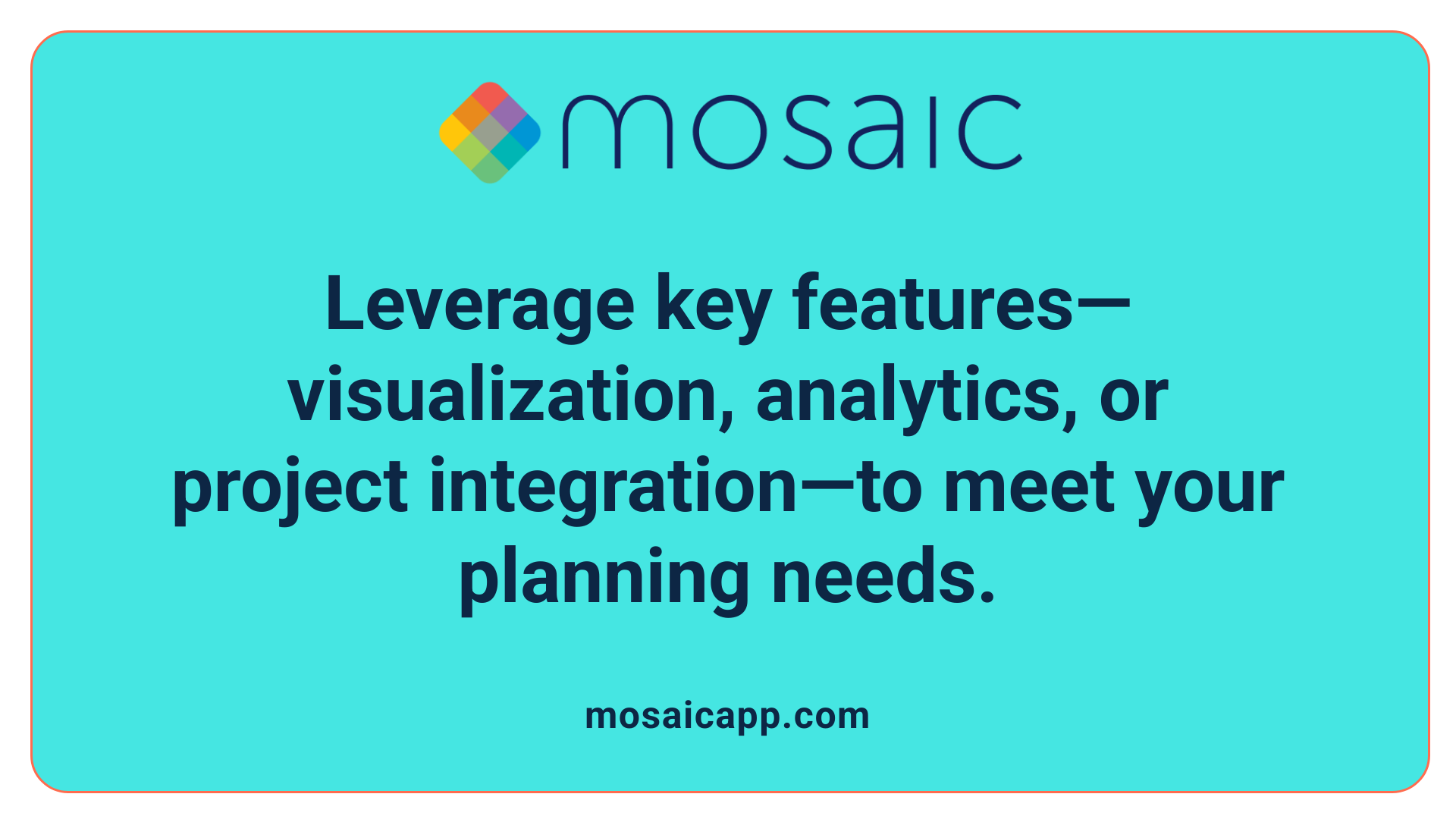
What are the key features and strengths of Mosaic and Deltek in scenario planning?
Mosaic and Deltek are both influential in the realm of scenario planning, each offering unique features that cater to different organizational needs. Mosaic is renowned for its user-friendly interface and flexibility. It allows users to swiftly create detailed scenarios with ease, thanks to its intuitive design and seamless data integration capabilities. Its real-time analytics and visualizations enable teams to analyze potential outcomes visually and collaboratively, fostering strategic decision-making.
On the other hand, Deltek stands out with its comprehensive project management integration. It combines scenario modeling with vital functions like project controls, budgeting, and resource management. This integration is particularly advantageous for large or complex organizations that need to align various project elements with strategic planning. Deltek's advanced analytics allow for accurate forecasting and detailed scenario evaluation, supporting informed decisions across multiple parameters.
Both platforms score highly for their functionality, but they excel in different areas—Mosaic in ease of use and visualization, and Deltek in in-depth analytics and project integration.
Feature Mosaic Deltek Additional Details User Interface Very intuitive, easy for users While powerful, more complex Best for quick adoption and day-to-day use Data Integration Robust, supports multiple sources Integrates deeply with project management Suitable for organizations with complex operational needs Analytics and Visualization Strong real-time analytics and visuals Advanced forecasting, scenario comparison Useful for visual learners and strategic idea testing Collaboration features Facilitates teamwork Focused on project and resource planning Enhances cross-departmental communication
Understanding these distinctions helps organizations select the software that best fits their specific needs in scenario planning, ensuring they leverage the most suitable features for strategic success.
Comparative Analysis: How Do the Tools Handle Scenario Tasks?
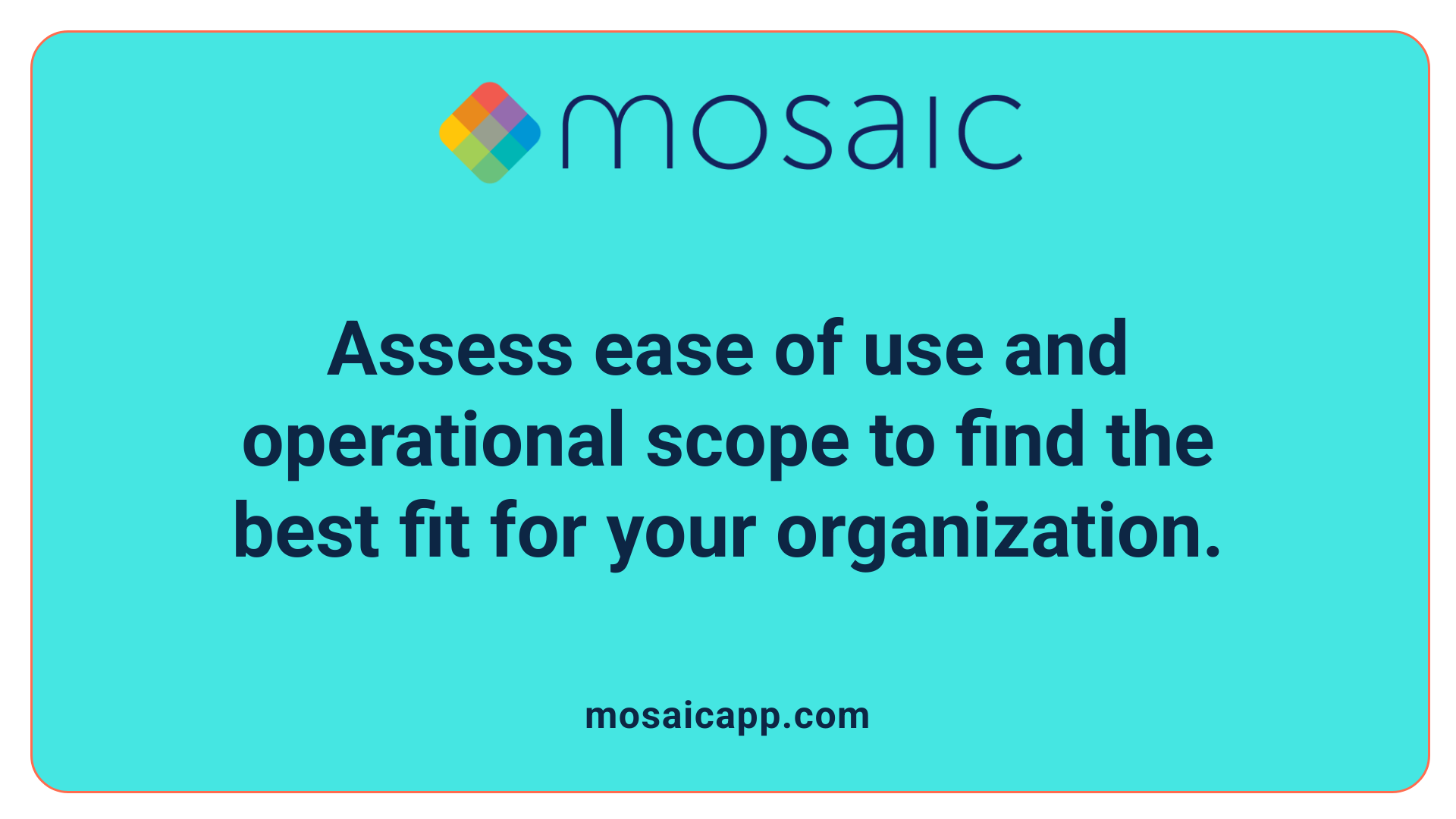
How do Mosaic and Deltek compare in handling scenario planning tasks?
Mosaic and Deltek are both capable tools for scenario planning, but they cater to different organizational needs and preferences.
Mosaic is known for its ease-of-use and flexibility. It offers a user-friendly interface that allows teams to quickly create and visualize various scenarios. This makes it ideal for organizations that need to perform rapid, iterative scenario analyses across different planning activities, such as resource allocation and workforce planning.
Deltek, on the other hand, is designed to handle more complex and large-scale scenario modeling. Its strengths lie in its deep integration with project management workflows, enabling detailed simulations and precise resource forecasting. It is particularly suited for organizations managing multiple projects where in-depth scenario analysis is necessary for strategic decision-making.
Both tools excel in their domain, but the right choice depends on an organization’s specific needs.
Operational focus of Mosaic—resource and workforce planning
Mosaic focuses heavily on resource and workforce planning, providing an accessible platform for organizations to adjust variables and see immediate outcomes. Its flexibility is a significant advantage for teams needing quick adjustments and visual results.
Deltek’s project-centric scenario analysis
Deltek emphasizes project-centric scenario analysis, offering detailed tools for modeling project dependencies, resource constraints, and financial impacts. Its capacity for in-depth scenario simulation makes it a favorite among large enterprises with complex project portfolios.
Strengths in modeling and forecasting
Both tools are strong in modeling and forecasting, but their strengths are tailored to different contexts:
Feature Mosaic Deltek Additional Details Ease of Use 4/5 3.5/5 Mosaic offers a more intuitive interface Value for Money 3.8/5 3.5/5 Both are cost-effective; Mosaic slightly higher rated Customer Support 4/5 4/5 Equal ratings, indicating reliable support Modeling Capabilities Moderate, flexible Advanced, detailed Deltek excels in complex scenario modeling Suitable for Large-scale Moderate Yes Deltek is better suited for large enterprises
This comparison aims to help organizations identify which tool aligns better with their operational focus and planning complexity. Whether prioritizing ease-of-use and agility or depth of analysis, understanding these distinctions will support a well-informed decision.
Key Considerations for Choosing the Right Tool
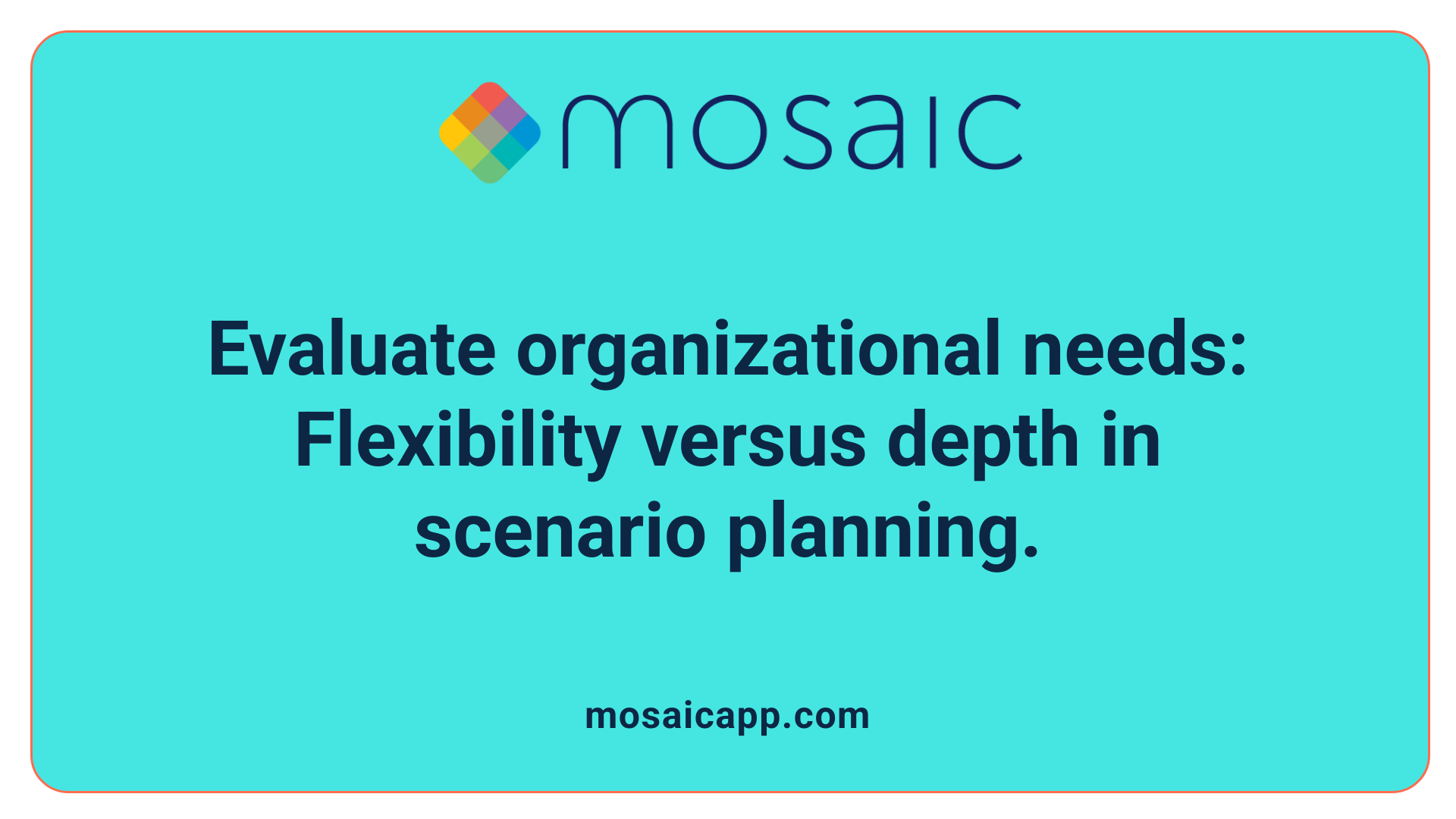
When deciding whether to use Mosaic or Deltek Costpoint for your business needs, it's important to evaluate several critical factors. The scale and complexity of your organization's operations play a significant role in this decision. Smaller teams with straightforward requirements might find Mosaic's features and interface more suitable, given its favorable ratings for ease of use and value for money.
Integration capabilities are another vital consideration. You should assess how each software interacts with your existing systems such as enterprise resource planning (ERP), customer relationship management (CRM), or other data platforms. Seamless integration ensures smoother workflows and reduces data silos, which is essential for comprehensive scenario planning.
User interface and ease of use are also crucial. Software that is intuitive and user-friendly promotes faster adoption across teams, which in turn increases efficiency. Both Mosaic and Deltek have different design philosophies; choosing one that your team can navigate comfortably will improve overall productivity.
Furthermore, consider the features each platform offers to support strategic decision-making. This includes forecasting accuracy, collaboration tools, visualization options, and reporting capabilities. These features directly influence how effectively your team can analyze scenarios, plan for the future, and make informed decisions.
Ultimately, choosing between Mosaic and Deltek should align with your organizational workflows, your data management practices, and your strategic goals. Our platform can offer personalized guidance—through expert reviews and user feedback—to help you find the optimal tool for your specific needs.
Conclusion: Making the Right Choice for Your Business
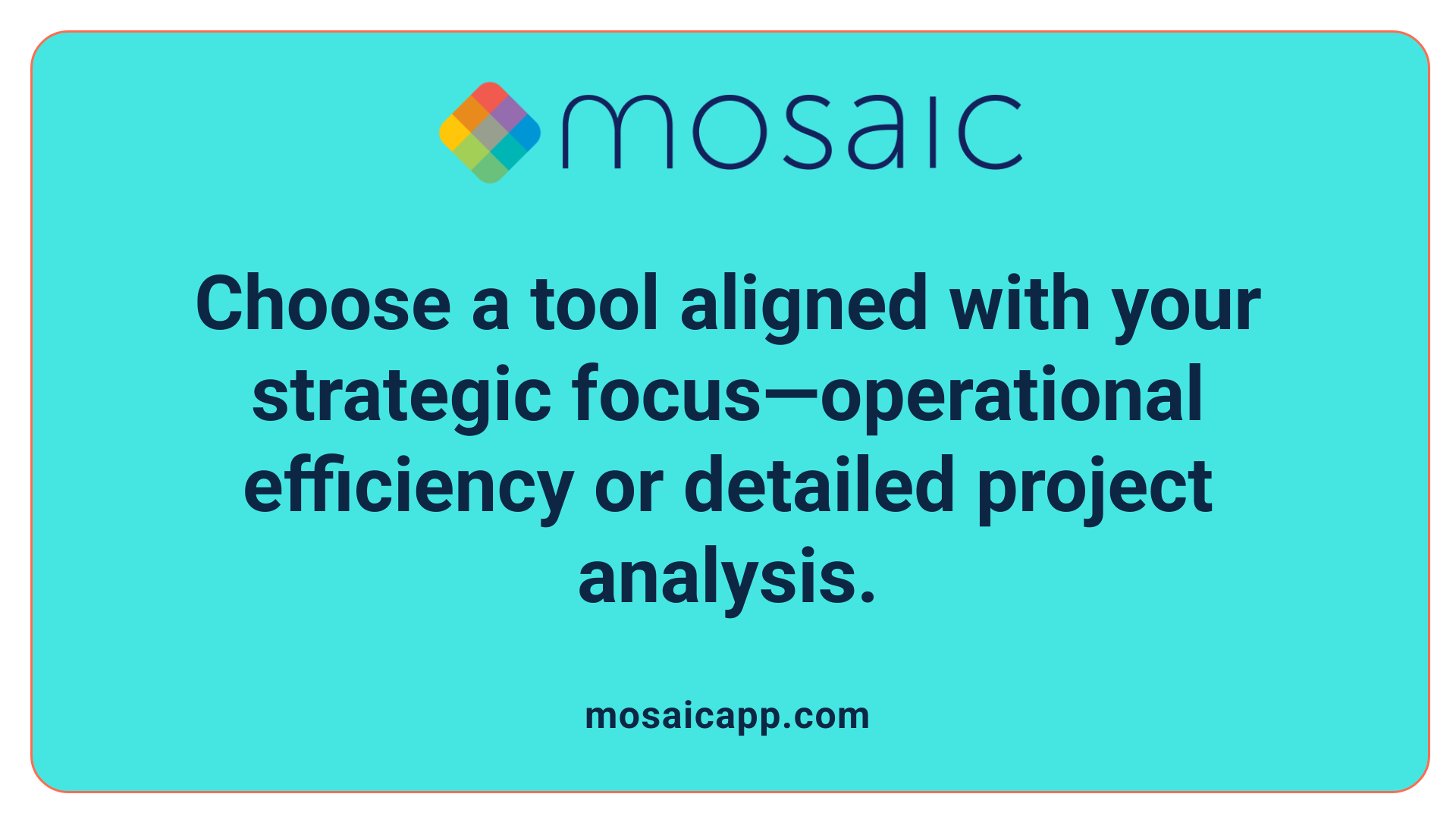
When choosing between Deltek Costpoint and Mosaic, understanding their different focuses and strengths can help organizations select the most suitable tool. Both platforms support scenario analysis but do so with distinct priorities.
Mosaic centers on AI-driven resource planning, workforce management, and real-time analytics. Its strengths include automatic data collection, aligning staffing with project deadlines and budgets, and seamless integration with financial tools. This makes Mosaic particularly valuable for operational efficiency, workforce optimization, and enhancing productivity and profitability.
On the other hand, Deltek Costpoint (or Vantagepoint) offers robust project management functions. It provides a detailed view of client, project, and financial data, making it well-suited for strategic project oversight and financial decision-making. Its scenario modeling tends to focus on evaluating project execution, client relations, and fiscal outcomes.
Both tools aim to facilitate better decision-making through their scenario analysis capabilities. However, your choice should depend on your organization’s priorities:
Aspect Mosaic Deltek Focus Workforce and operational efficiency Project management and financial oversight Scenario Strength Staff alignment, resource planning Project and fiscal scenario modeling Best For Operational teams, workforce optimization Project managers, financial planners
Ultimately, organizations focused on operational efficiency and workforce insights may prefer Mosaic, while those prioritizing project and financial management might lean toward Deltek. Matching the software’s strengths with your organizational needs ensures you select a tool that truly supports your strategic goals.
Picking the Best Tool to Support Your Strategic Goals
Both Mosaic and Deltek are powerful platforms that excel in different aspects of scenario planning. Mosaic shines with its intuitive interface, rapid modeling capabilities, and focus on operational and workforce scenarios, making it ideal for organizations prioritizing agility and efficiency. Deltek, with its comprehensive project management integration, advanced analytics, and detailed scenario capabilities, is better suited for complex, project-driven organizations that require in-depth analysis and precise forecasting. The decision ultimately hinges on aligning each platform’s strengths with your organization’s specific needs—be it quick adaptability or deep, analytic-driven planning. Carefully assessing your operational complexity, integration needs, and strategic objectives will guide you toward the platform best positioned to support your future growth and decision-making processes.
